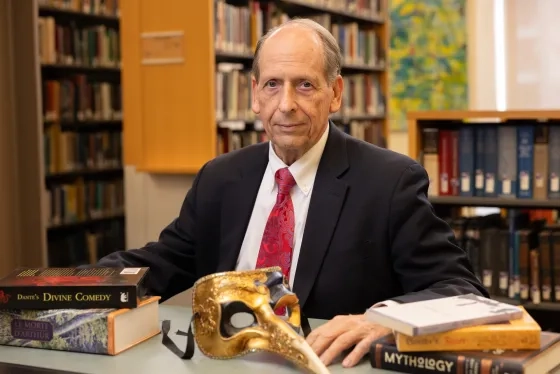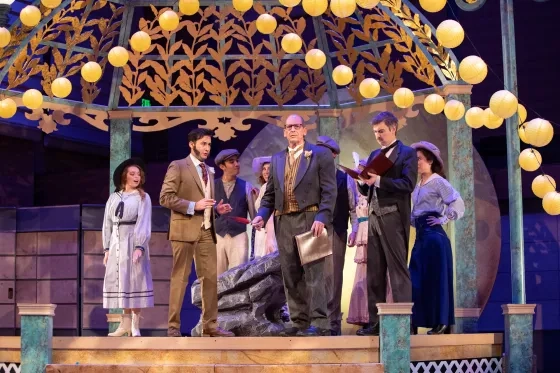Dr. Nikolaus Hohmann on Guiding the Humanities Into the 21st Century
News StoryAs the Daniel E. Koshland Endowed Chair in Humanities, Dr. Hohmann's teaching takes students beyond the stage, the page, and the practice room and into the wider world.
One shouldn't put too much stock in RateMyProfessors.com, but SFCM's Humanities Chair, Dr. Nikolaus Hohmann, sticks out regardless. He has the most amount of "reviews" on the site, with 31 five-star ratings and a 100% "would take again" ratio. Spend any amount of time with him—or any of the current students or alumni who've taken his classes—and you'll understand why.
Hohmann's enthusiasm for his work is readily apparent, and infectious, and in his nearly 33-year career at the Conservatory, the artistry of thousands of young musicians have been impacted by his guidance. Hohmann's own artistry lies in engaging students with the world beyond their most immediate concerns as conservatory students—practicing and performing—and showing them how that world can enrich their music and enrich their lives. The SFCM Newsroom spoke with Hohmann about his approach to teaching and the world of the humanities at large.
You've been at SFCM for nearly 33 years now, and in that time, the world has seen a lot of changes: the 24-hour news cycle, the internet, social media. How have you navigated those changes within your discipline?
I think the same fundamental principles still work. When I first started here, it occurred to me that we live in a very visual culture, that's why I decided on slides at that time, which then evolved into PowerPoint. It gives me an opportunity to show some of the great beauty that's available in our world and to illustrate stories – one of my favorite teaching tools. I think that's very important, but one of the things that I've always liked to do is just change things around, because if you maintain one particular line of thought for over an hour, students kind of drift off. Nowadays with smartphones and social media, that's even more the case. We all feel the pull of social-media-induced curiosity, so I do think we also have to help students overcome some of the social media addictions we all have. It's useful for students to be able to actually focus on something besides their small screens, and we do need to help them develop this detachment which allows for true engagement.
Your philosophy classes come up a lot as a particular favorite for students. How do you approach a philosophy class for musicians?
Well, I don't actually gear the classes for musicians. I mean, I do bring in more music than I would if I were teaching engineers, for example. But I think the key element in philosophy is that there are basic human dynamics and truths at work, whether in metaphysics or ethics or aesthetics, that are always relevant to what's going on. So for example, with metaphysics, I start with the cosmological. How have humans seen themselves within the universe? And of course, that's changed over time. For example, there was a great battle as to whether the Earth is the center of the universe, or whether the Earth revolves around the Sun. Which leads to a deeper question : from where do we get our knowledge – personal experience or the Great Authorities? Today, do you and I know the Earth revolves around the sun, even though you and I can’t prove it? Or do we just believe it, because the authorities tell us so? This dilemma, and so many more philosophical issues, are still relevant today.
As the humanities curriculum expands, how do you balance the new and the old?
I now teach 18 different courses that rotate across three years, but I always update them. And whenever I give any lecture, I get a sense about what worked, what didn't work, things that we want to add the next time around. For example, Introduction to Western Civilizations was focused on just that, in a much more traditional form, and as soon as I took it over, I started expanding it, because I do think that knowing something about other cultures really helps you to understand your own cultural identity. So the Western Civ course has evolved into much more of a world civilization kind of course. You do want to balance, for example, history and art with current concerns about colonialism and imperialism. You want to have a teaching culture where you don't just project outwards, but you absorb student contributions as well.
What are your thoughts on the current state of humanities as a discipline across the country?
I think it's been embattled for a long time, partially ideologically and partially financially. But I also think that one of the gravest problems is when people in a profession get bored with their profession and become cynical. It's true in medicine, engineering, and academics, but that's not my case. I love teaching, I love what I teach because I'm constantly exploring and adding new things. This is why I really enjoy the classes I present. When we have discussions, you learn a lot from students because, of course, their experiences are different, and so we can learn from each other. Plus there's always a new angle to explore and that's why the humanities remain a vibrant field, regardless of the external pressures.
What do you hope to pass on to music students when it comes to the humanities?
The whole intent of the humanities here is to broaden students’ perspectives. In Western Civ, when we talk about the Greeks, I give them a basic vocabulary of architecture: Ionic columns, Doric columns, et cetera, because once you know what something is called, you start to see it. One of my students once came up to me after class and said, 'After your lecture yesterday I discovered I have Corinthian columns in my living room.' And that’s the point. But it isn't just about seeing architecture. It's also about seeing wisdom in literature, in art, and, most importantly, about gaining insights into the human nature which we all share—to understand others and ourselves better.
Learn more about the Humanities and Sciences department at SFCM.

